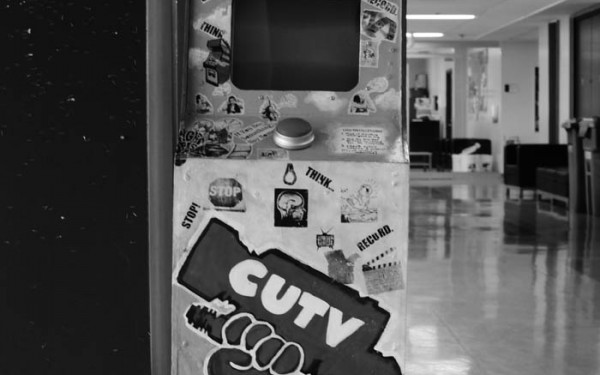Renaissance Man
Kai Nagata on the Possibilities of Post-Corporate, Citizen Journalism
Kai Nagata suggested we meet at the bar where, just one night prior, he gave a very regular patron a very fake name.
Taking out his wallet during a second round, he flashed me an old, CTV-issued piece of identification. Bangs in an impeccable, immobile news-anchor pompadour, the only thing recognizable in Nagata’s angular face are the determined brown eyes. The bearded man drinking a beer before me could be a different person entirely.
Nagata is a journalist that struck a national nerve last July when he walked away from his “great job, especially for a 24-year-old” working as CTV’s Quebec City Bureau Chief and wrote a lengthy explanation of his move on his website, kainagata.com.
Part rationale, part media criticism and part manifesto, his blog post, “Why I Quit My Job,” received substantial attention across the country.
Some of the thousands of comments that came with the storm of viral backlash and back-and-forth wrote him off as self-indulgent, questioning his wisdom, while others hailed him a visionary.
“As a reporter, I feel like I’ve been holding my breath. Every question I asked, every tweet I posted, and even what I said to other journalists and friends had to go through a filter where my own opinions and values were carefully strained out,” he wrote at the time.
“If I ever said anything out of line with my position as an ‘objective’ TV reporter, they had grounds to fire me. I had a sinking feeling when I first read that clause, but I signed because I was 23 and I wanted the job. Now I want my opinions back.”
Nagata said he is far happier today than he was before.
“I felt like I was going crazy, having that much of a gap between who it was I wanted to be [and who I was]. I couldn’t recognize the two,” he said. “I’ll give you an example: what does it mean to your identity to play a character on air that everyone assumes is straight, but actually be gay?
“That’s something a disproportionate number of male of broadcasters deal with, and I can’t claim to get inside their heads, but I know it’s tough to compartmentalize that this is who I am on air and this is who I am the rest of the time.”
Emphasizing a self-censorship that occurs in journalism when reporters are forced to adopt a “he-said, she-said mentality” to storytelling that lacks a deeper, or more informed analysis, Nagata argued the current framework makes it difficult to create media that makes a difference.
“I recognize that people try every day to put out better stuff than the kind of ultimately useless, non-analytical representation of events,” he said.
“But the reality is that the economic context forces you […] to do some lazy-ass journalism from time to time. And I think that starts to chip away at your integrity and values, because that’s your name on the byline, your face on the TV or your voice on the radio.”
Though people across the country called him naive for leaving the system, Nagata demurred. Rather, he said, it’s naive to believe things can be changed from the inside in an institution like media.
“Give me an example of when that’s worked and I’ll happily discuss it,” he said with a chuckle.
“Let’s put it this way: is there any reason to be hopeful about the existing model? I don’t believe that unlimited growth is possible forever. And saying that out loud makes you a heretic. It’s not a viable model for your career or for the global economy.”
After taking a decision to strike out against the “internal, self-regulated culture of news,” Nagata gave away most of his worldly possessions in Quebec City and spent the rest of his summer occupying his father’s backyard, living in a tent.
He eventually became a writer in residence at The Tyee, an independent online magazine based in British Columbia, while making plans to work on changing how news is produced from the outside.
His first project, Renaissance Man—the debut installation of a possibly three-part documentary he filmed in California about a Montreal-based, blind British dirt bike jumper named Matthew Wadsworth—also quietly hit the Internet last week.
“What I’m trying to experiment with right now is a ground-up sustainability model to media production,” he said. With a budget cultivated online from donors, “we proved we could make something cool with very little money and without any networks, distributors or advertisers calling the shots.
“Think about how far [our budget of] $5,000 would go at a TV station,” he mused. “It would keep the lights on for the first half of the day. But if you can strip down the process […] it’s possible to create a model of efficiency that allows you to tell ambitious stories.”
Nagata’s bold prediction is that creating a more sustainable model of producing media now will better prepare journalists if there’s another recession—and another round of industry downsizing.
And while he’s got his hands full at the moment, currently en route to England to put together part three of Renaissance Man, Nagata is also in the early stages of developing an interactive online network and skillshare for citizen journalists.
“Think of it like a Facebook for citizen journalists,” he explained, “or a hybrid news site, training resource and meeting place.”
It is the projects like these that keep him extremely hopeful about the future of Canadian journalism and the quality of the people working in it, he said.
Plugging away at Renaissance Man, Nagata said his progression away from the corporate journalist has allowed a more creative and resourceful side to flourish.
“The more time you can give yourself to think deeply, to read, to reflect, to examine your own causations and feelings, the more you have time to work on yourself and your own work, rather than someone else’s,” he explained. “When you’re not working for someone else, all kinds of interesting things happen with those creative muscles.”
Check out Nagata’s new film project Renaissance Man at kainagata.com

_900_600_90.jpg)





